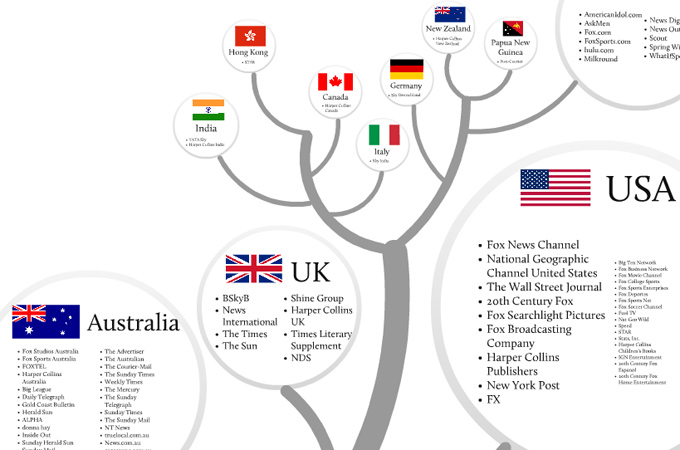- Media concentration / Conglomerates / Globalisation (in terms of media ownership)
- Media Concentration – Process whereby progressively fewer individuals or organizations control increasing shares of the mass media
- Media Conglomerates – A company that owns numerous companies involved in mass media enterprises, such as television, radio, publishing, motion pictures, theme parks, or the internet
- Media Globalisation – The phenomenon of expanding multinational corporate media investment, resulting in the emergence of a global oligarchy ( a small group of people having control of a country or organization. ) of first tier corporations, which own and operate a variety of mass media content and distribution technologies including: television, radio, film, music
- Vertical Integration & Horizontal Integration
- Vertical Integration is where companies own or control its suppliers, distributors or retail locations to control its value or supply chain. Benefits companies by allowing them to control process, reduce costs and improve efficiencies.
- Horizontal Integration is the process of a company increasing production of goods or services at the same part of the supply chain. This may be done through internal expansion, acquisition or merger. This process can lead to monopoly if a company captures the vast majority or the market for that product or service.
- Gatekeepers – A person who controls access to something, e:g via a city gate/bouncer, granted access to a category or status. They asses who is in/out
- Regulation / Deregulation
- Regulation – A rule or directive made and maintained by an authority
- Deregulation – The removal of regulations or restrictions, especially in a particular industry
- Free market vs Monopolies & Mergers
- Free market – An economic system in which prices are determined by unrestricted competition between privately owned businesses
- Monopolies – The exclusive possession or control of the supply of or trade in a commodity or service.
- Mergers – A combination of two things being changed/moved into one, merging of one estate/title in another
- Neo-liberalism and the Alt-Right
- Neo-liberalism – The 20th-century resurgence of 19th-century ideas associated with economic liberalism and free-market capitalism. The term is rarely used by proponents of free-market policies.
- Alt-Right – An ideological grouping associated with extreme conservative or reactionary viewpoints, characterized by a rejection of mainstream politics and by the use of online media to disseminate deliberately controversial content
- Surveillance / Privacy / Security / GDPR
- Surveillance – Close observation
- Privacy – A state in which one is not observed or disturbed by other people
- Security – The state of being free from danger or threat
- GDPR – General Data Protection Regulation, agreed upon by the European Parliament and Council in April 2016, will replace the Data Protection Directive 95/46/ec in Spring 2018 as the primary law regulating how companies protect EU citizens’ personal data
Media ownership and structure:
- Paul Gilroy could be a related theorist as he talks on the theme of double consciousness, eg in Bombshell everyone thought the CEO of Fox News Roger Ailes was this successful and nice guy but he turned out to be someone no one expected. There’s a hierarchy within the organisation and many women lived in fear due to Roger and his ways (this is because he had the power, he could do what he wanted), in order to be successful and get promotions one had to do something Roger had asked because they wanted/needed that promotion. Manufacturing consent comes into play here (Chomsky)
- Horizontal integration which is where a company can spread their company/business further and spread their ideas further, this means they can reach more people
- Chomsky focused on manufacturing consent, eventually people will believe what they’re reading. Cultivation theory comes into play as well
- With ownership comes power, Media outlets are able to manipulate people in order to get them to see their views or believe something that may not be true
Murdoch Media Empire




